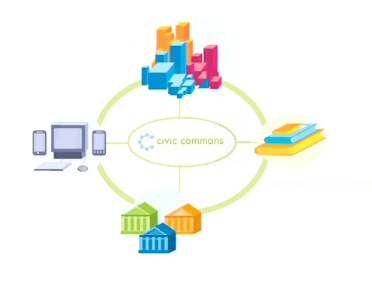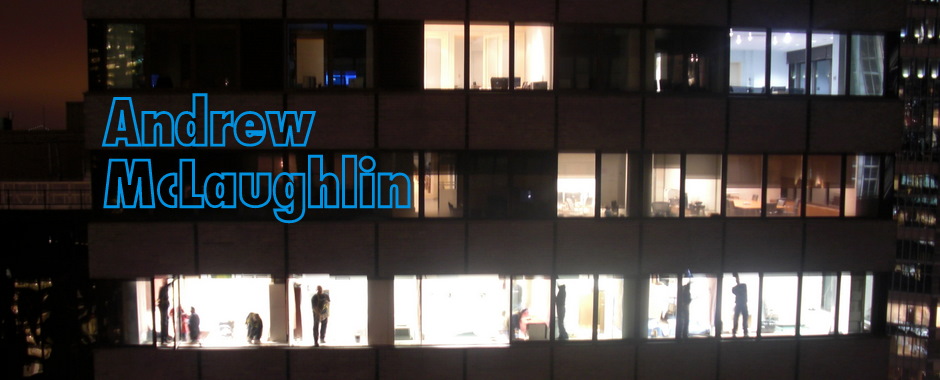Why We’re Building a Civic Commons — And How You Can Be Part of It
Walk down any major street in any city in the world and you’ll pass by hundreds of pedestrians — and, let’s be honest, more than a few drivers — typing into smart phones. Each of these individuals holds in one hand more computing power than the entire NASA space operation that delivered men to the moon and back in 1969.
It can be hard to recognize how fast and how deeply information technology is changing our day-to-day lives, and how profound the implications can be. Every year, thanks to Moore’s Law, the speeds of our laptops and devices go up even as the cost of computing goes down. Internet bandwidth gets ever faster and cheaper, and wireless connectivity ever more ubiquitous. As a result, the cost of creating, organizing, analyzing, and distributing information has plunged dramatically over the past two decades. Today, an ordinary individual can communicate instantly with any connected person anywhere in the world; she can broadcast her ideas globally, readable by anyone with an interest.
Thanks to the ever-improving economics of computing, a company like Facebook can offer hundreds of millions of individuals the ability to tap a vast computing infrastructure optimized to publish their writings, deliver their messages, and store vast and growing oceans of multi-megapixel images — and all for free, funded by tiny incremental payments from advertisers. That’s how efficient and cheap computing power has become.
To put that in context, consider this: It currently costs about $150 to buy a hard disk with a terabyte of data storage, and it sits on the corner of your desk; as recently as the early 1990s, you would have had to spend over $1.5 million to buy the same thing, and it would have taken up a full corner of your room.
Or this: The iPad 2 is roughly 1,500 times faster than the CDC 6600, NASA’s fastest supercomputer in 1969. The cost of an iPad 2 is currently $499; the cost of a CDC 6600 in 1969 was roughly $58,000,000, in inflation-adjusted 2010 dollars.
Amazing, right? But here’s the problem: As William Gibson puts it, “the future is already here — it’s just not evenly distributed.” In particular, our governments — the agencies and departments and legislatures and courts that our democratic processes have ordained to serve the public — are finding it extraordinarily difficult to understand, much less embrace, the possibilities created and imperatives imposed by the technological advances we take for granted in our private lives.
Civic Commons, the new initiative I’m pleased to be joining today, is an effort to answer that problem. We believe that governments — especially the cities, towns, and counties that are on the hook to deliver public services every day — can now take advantage of the same technologies and techniques that have generated such enormous efficiencies and enabled such impressive new services by private enterprise. In a digitally interconnected world, cities don’t have to operate in isolation. They don’t have to reinvent (or re-procure) the wheel every time they face a problem that technology could help address. Cities can pool their resources — their talents and ever-shrinking budgets — to build shared technologies. Just as open standards (e.g., the Internet protocols), shared infrastructures (e.g., cloud computing), and collaborative software (e.g., open source projects like Linux, Mozilla Firefox, and Apache Hadoop) have powered astonishing advances in personal and enterprise computing, it is now time for governments to put them to work for the public good.

We believe that governments can now build and deploy shared technologies — open standards, common infrastructures, collaborative projects, and open source software, together with proprietary systems — to improve public service delivery, transparency, accountability, public participation, and management effectiveness, all while spending less.
In sum, Civic Commons is built around two central convictions: first, that wave after wave of innovation is delivering amazing new capabilities to the people and organizations that can take advantage of them, and second, that, with a little help, governments can absolutely understand and seize the opportunities created by the rapid evolution of information technology.
So how are we going to do it? Civic Commons will operate as a neutral and expert non-profit that (a) helps cities and other governments understand the possibilities and pitfalls around shared technologies, (b) provides technical assistance, (c) facilitates the creation and management of collaborative technology projects, (d) connects interested cities with peers, collaborators, experts, vendors, and other supporters, and (e) creates high-quality information — such as guides, checklists, how-to’s, and a comprehensive catalog of civic technology — that is as comprehensible and useful to mayors, city managers, and citizens as it is to software engineers.
We’ve already got a great set of projects underway (for example, Open311), an active and engaged set of city and other government collaborators (NYC, San Francisco, Washington, Seattle, Boston, Chicago, Los Angeles, just to name some big ones), a growing community of motivated, civic-minded technologists, and a set of plans to broaden participation, especially by smaller cities and towns and those outside the U.S.
We also have a fantastic set of launch partners, including our major launch funder, the Omidyar Network; our incubator organizations, Code for America and OpenPlans; and our stalwart supporter, O’Reilly Media. (Huge thanks for their extraordinary contributions.)
Whether you are a mayor, a city CIO, a budding technologist, an open source veteran, a civic activist, an entrepreneur, or just an interested citizen, we hope that you will get inspired and get involved in Civic Commons. Check out our projects, contribute to our wiki, join our mailing lists, orcontact us directly.
Together, we can tap everyday technological innovation to make government work better and cost less.
Andrew McLaughlin
Executive Director
Civic Commons

(For more information about Civic Commons, read the full release for the announcement.)
[This ran originally as my first blog post at civiccommons.org.]









